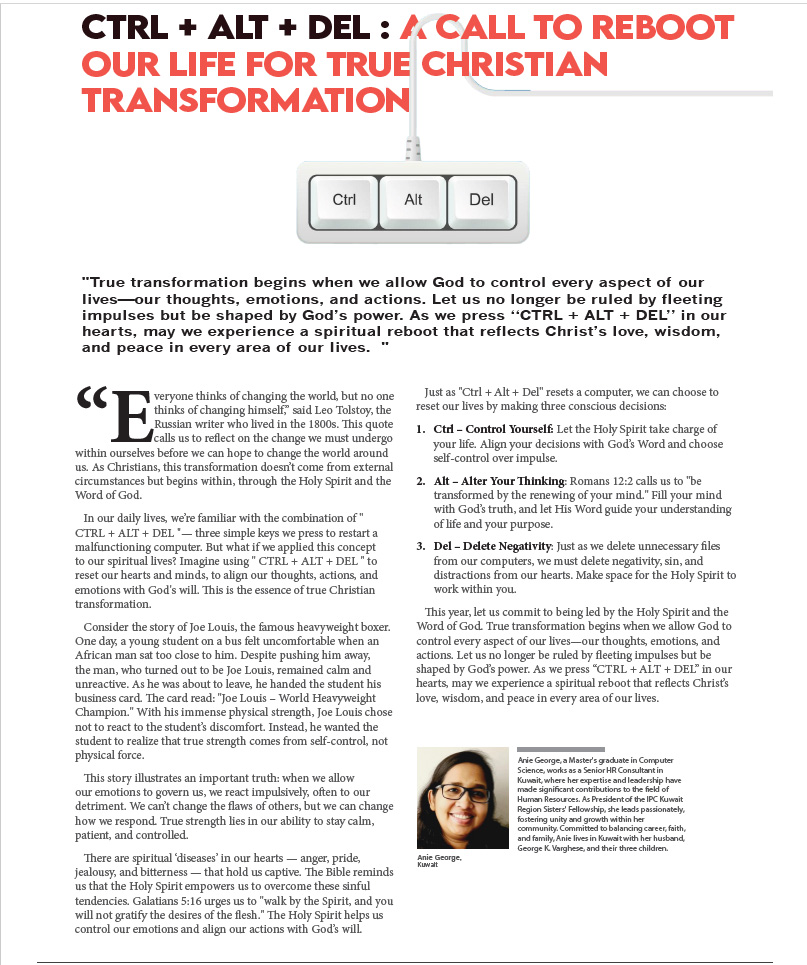Articles
4 ways Isaiah shows Jesus’ trustworthiness

Trusting others presents massive challenges in our fallen world. Everyone has been corrupted by sin, and therefore fails to be fully faithful or trustworthy. As Proverbs 20:6 says, “Many a man proclaims his own loyalty, but who can find a trustworthy man?”
While humans prove to be both distrustful and untrustworthy, God presents Himself as the One we can supremely trust for everything in this life and beyond the grave. We see an intentional emphasis in Scripture on the trustworthiness of God, but Scripture does not command us to have blind faith. The Lord instructs us to trust Him, and then He demonstrates He is worthy of our trust. God never speaks, and then fails to act. He always proves Himself faithful.
Despite this truth, we often struggle to trust God, which manifests itself when we give in to sin in times of various trials and temptations. So how do we grow our trust of our Lord and His power over our sin?
We find a helpful answer to this question in Isaiah 53. Here, God reveals His Suffering Servant, the Lord Jesus as eminently trustworthy. Whether we suffer because of trials or temptations, Jesus can be trusted to see us through and bring God’s covenant promises to fruition.
There are four ways Isaiah shows Jesus’ trustworthiness in this passage.
First, Jesus humbled Himself when we were proud.
At the start of this chapter, Isaiah laments Israel’s unbelief. Just before, in Isaiah 52, we learn that the Gentiles would marvel at the exalted Servant. Yet when the scene flips to Isaiah 53, regardless of the magnificent salvific promises of the previous passage, we observe the ongoing disbelief of people who have had a front-row seat to God’s work. What makes God’s promises so difficult to trust? Isaiah answers by showing us the Servant’s humility alongside the pride of sinners who reject God’s word.
Isaiah gives a description of the Servant’s humility, using agricultural pictures to convey Jesus’ outward appearance as useless and unfruitful. The Servant came in the humblest of ways, and His circumstances and appearance made Him look dispensable. People would have contempt for God’s Messiah and suffering Servant.
Thus, we see both the humiliation of the Servant and the pride of man. God in human flesh descends to us, and we despise Him because He does not meet our ideals. God, however, sees us in our pride, knows how we will respond, and still comes to save us from sin.
Jesus proves Himself trustworthy in His willing humiliation for prideful sinners. Isaiah includes himself in those who thought little of the Servant, saying, “We did not esteem Him.” We must include ourselves in that we. Apart from God’s grace, we rejected Him. Christ, though, condescended to save us, showing He is trustworthy.
Second, Jesus was faithful when we were not.
Isaiah paints a rather ugly picture of us. The Servant was carrying our griefs and sorrows, but we saw His suffering and said, “God has rightly stricken Him for His sins.” We were unfaithful hypocrites, thinking we stood blameless before God’s law as we cast condemnation on His very own Christ!
The reality is Jesus was pierced and crushed for our transgressions, our iniquities, and our acts of ungodliness! He took the punishment we deserved so we might have peace, wholeness, and well-being. He healed us of our sins by enduring the scourging. We thought we could condemn God’s Servant, but we were actually under God’s curse.
This, though, was God’s purpose and plan, according to Isaiah. That plan involved Christ suffering and dying for us. God Himself caused our unrighteousness, sins, and disobedience to fall on Jesus. God imputed our sins to Jesus on the cross. Jesus stood in our place, took our sins and the wrath of God, and bore our punishment so we could have shalom with God.
The irony here is stark. The prophet says we looked at Jesus and thought, “God punished Him because of His sin,” but God did this to Him because of our sin. Jesus faithfully submitted so we could be forgiven, stand righteous before God, and be made whole again. Jesus’ faithfulness, even while we were faithless and lost, inspires confidence and trust in Him.
Third, Jesus submitted to death when we deserved it.
Verses 7-9 are remarkable in portraying our Savior’s substitutionary death on the cross.
Jesus was treated with contempt, but He was silent like a sheep before shearers. He suffered horrifically, received no justice, was humiliated, and died childless, a sure sign to that culture that God’s displeasure rested upon Him. His separation from sinners, even though He identified with them, was made clear in His burial.
Isaiah then inserts the phrase, to whom the stroke was due, referring to the utter condemnation God brings down upon sinners. This is another reminder of Jesus’ faithfulness. We should have suffered the wrath of God, but Jesus absorbed the condemnation we deserved.
Think about the ways we are tempted not to trust Jesus, Christian. Jesus took our place and bore in His own body our sins, sorrows, griefs, and condemnation; and He went to this extreme to bring us peace, to free us from the guilt of sin, and to save us from eternal punishment. The question is never, “Is Jesus going to provide everything we need to live before Him and attain salvation on the last day?” The question is always, “Do we trust Him?” He died for us when we deserved death. We have every reason to trust Him.
Finally, Jesus gained the victory over sin when we were the transgressors.
The resounding theme of verses 10-12 is the Suffering Servant, though crushed and stricken, was ultimately victorious.
We see Jesus’ victory over sin in His resurrection in verse 10. The Lord was pleased with the Servant’s suffering because Christ’s death was an offering to remove our guilt.
God was pleased because the cross was not the Servant’s end. Through His death, Jesus was fruitful, and the things that please God would flourish through Christ’s work. He would live forever, even though He died a horrific death.
Jesus’ victory over sin is assured in His success in justifying sinners. The result of Jesus’ anguish would be satisfaction for Him, and justification for us who trust in Him. Jesus was victorious over sin, not in some abstract sense, but in the very real sense that our sins are forgiven, cast into the depths of the sea, as far as the east is from the west; and we are now one with the Righteous One, so that His righteousness has become ours.
We also see Christ’s victory in His exaltation. He, who appeared to be nothing more than a cast off, was the mighty warrior who leads the conquerors in celebration over their enemies. Why? Because He bore our sin and interceded for us, the transgressors, which is the strongest word Isaiah could have used to picture someone’s wickedness.
Jesus showed Himself trustworthy by gaining victory over sin when we were the transgressors. Through His resurrection, justifying work, and exaltation, Christ is worthy of our trust and confidence. When the apostle Peter read Isaiah 53 and saw what Jesus had done for His people, his response was to see Jesus’ suffering as a model of His faithfulness, so that no matter what we are experiencing or facing, we can trust ourselves to Him.
Sources:Christian Post
Articles
CTRL+ALT+DEL: A call to reboot our life for true Christian transformation
Articles
7 ways we rebuild through Christ

When a person comes to Christ, it’s not just about being forgiven and waiting for heaven. Salvation is an ongoing process of regeneration where a person becomes a new creation, reshaped by the power of the cross. This process involves rebuilding every area of life according to God’s design. Today, we’ll explore seven key areas that are rebuilt in Christ.
1. Our personal life is no longer based on self
We are born in sin and naturally live according to the lusts of the flesh (Ephesians 2:1-3).
But in Christ, we begin to live a cross-shaped life, learning to deny ourselves and follow Jesus (Mark 8:34-36).
“And calling the crowd to him with his disciples, he said to them, ‘If anyone would come after me, let him deny himself and take up his cross and follow me’” (Mark 8:34-36).
The crucified life is a life where self is no longer at the center — God is. We are called to serve others, rather than live for self-gratification(Galatians 2:19-20).
We actually find our life when we lose it! We discover the best version of ourselves when we die to ourselves and allow Christ to live in us and through us.
2. Our families are shaped according to God’s Word
After coming to Christ, family life should be rebuilt and shaped by Scripture. One way is to disciple our children and teach them about God.
Psalm 78:5-7:
“He established a testimony in Jacob and appointed a law in Israel, which he commanded our fathers to teach to their children, that the next generation might know them, the children yet unborn, and arise and tell them to their children, so that they should set their hope in God.”
Furthermore, parents are instructed to raise their children according to the Word of God, ensuring that our homes reflect biblical values and generational faithfulness (2 Timothy 3:15-16).
3. We do business God’s way
The Bible teaches that work is not merely a means to provide for ourselves; it is an act of worship.
Genesis 2:15 illustrates that Adam was called to work even before he had a wife and children. It was an act of worship since, as His image bearer, he imitated the God who worked 6 days before He entered His rest.
“The LORD God took the man and put him in the garden of Eden to work it and keep it.”
Like Adam, we work because we are made in the image of a God who worked to create the world. In business, we walk in integrity, treat employees as partners, equip them to flourish in work, and prioritize honoring God. This means creating environments that reflect God’s kingdom values, including allowing people to worship on Sundays.
4. We use our wealth to spread the Kingdom
Deuteronomy 8:18 reminds us that God gives us the ability to produce wealth, not just for personal gain, but to advance His Kingdom. As believers, we are called to steward our finances in a way that reflects God’s mission, investing in the expansion of the gospel, meeting needs, and helping to establish justice and mercy on earth.
Money is not evil, but the love of money is evil. Money can also be used to advance the kingdom.
I.E., God was able to use “The Good Samaritan” because he had wealth (Luke 10).
God used Joseph of Arimathea who buried the body of Jesus because he had financial resources.
God used Lydia, who had her own business and started a church because she owned a home and was a business owner (Acts 16).
5. We are called to reflect Christ by serving our communities
Titus 2 and 3 show us that we are not just called to serve within the walls of the church, but to be profitable to all people.
2:7 says “Show yourself in all respects to be a model of good works …”
2:14 says Jesus purified people “who are zealous for good works.”
3:14 says “let our people learn to devote themselves to good works …”
This means our communities should see the light of Christ through our good works.
History is replete with how Christ’s followers have rebuilt cities and nations and served humanity in a way that forever impacted nations.
Isaiah 61:4 says:
“They shall build up the ancient ruins; they shall raise up the former devastations; they shall repair the ruined cities, the devastations of many generations.”
6. The Church is called to reparent and rebuild individuals
Jesus’ invitation to “follow me, and I will make you …” demonstrates the Church’s role in rebuilding lives (Matthew 4:19). Through biblical discipleship, we help people discover their God-given purpose and destiny.
Discipleship is more than instruction; it’s walking with people to see them transformed and equipped to fulfill their calling in Christ.
Jesus didn’t say, “follow me and I will give you a weekly bible study. He gave people the opportunity to do life with Him, which created the environment to make disciples and bring about personal transformation.
7. The Church participates in the renewal of all things in Christ
God called Adam to bring His influence on the whole earth.
Genesis 1:28. God’s ultimate plan with and through the church participating with Jesus is to renew all things through Christ (Ephesians 1:9-11). We are not just waiting for the second coming; we are active participants in the restoration of creation through the gospel. As we live in alignment with God’s kingdom, we anticipate the fulfillment of this promise in the climax of history with a new heaven and new earth (Revelation 21:1-8).
Five practical takeaways
1. Embrace daily denial of self: Evaluate your life and ask where you need to surrender personal desires in favor of following Christ. This is the first step toward living a cross-shaped life.
2. Create a family discipleship plan: Begin setting time aside weekly to disciple your children or encourage your family members in the Word of God. Make your home a center for spiritual growth.
3. Work with integrity and purpose: Consider how your work can reflect God’s glory. Are you treating your employees or coworkers with dignity and empowering them, or are you merely using them to get your work done?
4. Be a faithful steward of wealth: Make a decision to invest in Kingdom causes. Pray about where your resources can make a Gospel-centered impact — supporting missionaries, funding outreach, or caring for the poor.
5. Serve your community: Identify a way to serve your community this week. Whether it’s through volunteering, meeting a need, or simply being present in a meaningful way, show Christ’s love in action.
As we participate in this process of rebuilding, God transforms us, our families, our work, and, ultimately, the world around us. Let us surrender fully to Christ and trust Him to rebuild every aspect of our lives for His glory.
Sources:Christian Post
Articles
God’s peace and the world’s peace are not the same

Peace is not just a feeling, it is also a condition, a mindset, a state of being. It is a relationship with God Almighty who created you and loves you. Peace is where we want to live. But we live in an unpeaceful world full of strife, envy, jealousy, rage, competition, anxiety, fear, worry, and yes lust. We crave what we don’t have, and we don’t want what we do have. We long for peace.
The peace of God is the opposite of all that the world has to offer.
The world’s definition of peace is a state of tranquility, freedom from disturbance, and harmony in personal relations.
Who doesn’t want that?
Now listen to the story of Jesus and the peace He offers you and me.
“And the angel said to them, ‘Fear not, for behold, I bring you good news of great joy that will be for all the people. For unto you is born this day in the city of David a Savior, who is Christ the Lord. And this will be a sign for you: you will find a baby wrapped in swaddling clothes and lying in a manger.’ And suddenly there was with the angel a multitude of the heavenly host praising God and saying, ‘Glory to God in the highest, and on earth peace among those with whom he is pleased!’” (Luke 2:10).
Jesus comes to give peace!
Now you may think you know what peace is. But listen to what Jesus says about it,
“’Let not your hearts be troubled. Believe in God; believe also in me. In my Father’s house are many rooms. If it were not so, would I have told you that I go to prepare a place for you? And if I go and prepare a place for you, I will come again and will take you to myself, that where I am you may be also. And you know the way to where I am going.’ Thomas said to him, ‘Lord, we do not know where you are going. How can we know the way?’ Jesus said to him, ‘I am the way, and the truth, and the life. No one comes to the Father except through me’” (John 14:1).
Look at what Jesus also says in John 14:27: “Peace I leave with you; my peace I give to you. Not as the world gives do I give to you. Let not your hearts be troubled, neither let them be afraid.”
Jesus is the way to peace. And you may say, “Oh, I know what peace is!” But you don’t. You don’t know what peace is until you know Jesus. His peace is not like the world’s peace.
If you know Jesus, you will experience peace. If you don’t know Jesus, you won’t. Not in any real sense, that is.
The peace of God is a state of wholeness, calmness, and completeness.
As you compare the two definitions, the world’s definition of peace is an external definition based off circumstances and human relationships.
If you are trying to get to a permanent condition of peace based off external circumstances and human relationships, you are going to be more unpeaceful than you are now. The peace the world offers you is circumstantial. The peace God offers you is complete, consistent, whole, and perfect regardless of what is going on in your life. It doesn’t come from without, it comes from within.
Let me explain. When Jesus returned to Heaven he promised to send the Holy Spirit.
“These things I have spoken to you while I am still with you. But the Helper, the Holy Spirit, whom the Father will send in my name, he will teach you all things and bring to your remembrance all that I have said to you”(John 14:26).
The Greek Word here is Paracletos, “the one who comes along side” or the Comforter. The Peace giver! Jesus left earth and sent the Holy Spirit to live inside of us. Now look at the fruit of the Spirit that lives inside you:
“But if you are led by the Spirit, you are not under the law. Now the works of the flesh are evident: sexual immorality, impurity, sensuality, idolatry, sorcery, enmity, strife, jealousy, fits of anger, rivalries, dissensions, divisions, envy, drunkenness, orgies, and things like these. I warn you, as I warned you before, that those who do such things will not inherit the kingdom of God. But the fruit of the Spirit is love, joy, peace, patience, kindness, goodness, faithfulness,23 gentleness, self-control; against such things there is no law” (Galatians 5:18).
How do we unwrap God’s gift of peace in our lives? You and I must accept Jesus as God’s peace to the world. We must realize the world’s peace and God’s peace are not the same. True peace comes when we follow Jesus and not our own wishes or wants.
I don’t have to be worried because Jesus is my peace. I don’t have to be jealous because Jesus is my peace. I don’t have to be angry because Jesus is my peace. He has sent the Holy Spirit to live in me. I just need to keep in step with Him as He leads me into the peace He has for me in Jesus’ name.
Sources:Christian Post
-

 Travel10 months ago
Travel10 months agoയാക്കൂസ കരിഷ്മ:ഓല സ്കൂട്ടറിനേക്കാൾ വിലക്കുറവിൽ കുഞ്ഞൻ കാർ; സിറ്റി യാത്രകൾക്ക് ഇനി ഇവൻ മതിയാവും
-

 Movie4 months ago
Movie4 months agoFor KING + COUNTRY Stars’ Big Plan to Bring Message of Jesus, ‘Redemption of Humanity’ to People Across America
-

 Tech8 months ago
Tech8 months agoചിത്രങ്ങൾ എഡിറ്റ് ചെയ്യാം; വാട്സ്ആപ്പിലെ ‘നീല വളയം’ സ്മാർട്ടാകുന്നു, കാര്യമായ മാറ്റങ്ങൾ
-

 Movie4 months ago
Movie4 months agoFor KING + COUNTRY Stars’ Big Plan to Bring Message of Jesus, ‘Redemption of Humanity’ to People Across America
-

 Movie12 months ago
Movie12 months agoActor Ryan Phillippe ‘Craving’ Relationship With God After Movie About Christian Missionary
-

 Articles9 months ago
Articles9 months ago8 ways the Kingdom connects us back to the Garden of Eden
-

 world news3 weeks ago
world news3 weeks agoമ്യാന്മറില് സായുധസംഘത്തിന്റെ വെടിയേറ്റ് കത്തോലിക്ക വൈദികന് കൊല്ലപ്പെട്ടു.
-

 Hot News11 months ago
Hot News11 months ago3 key evidences of Jesus’ return from the grave

























